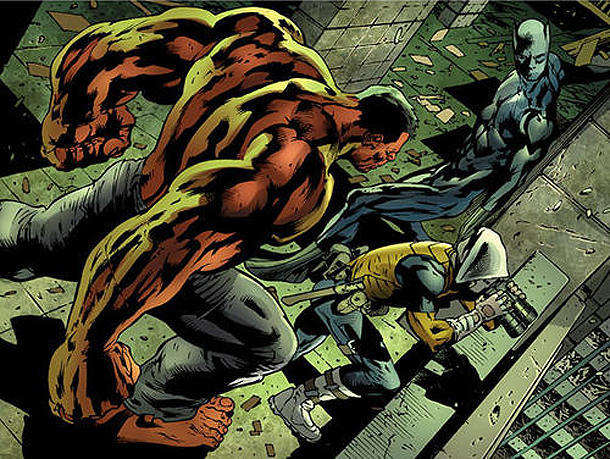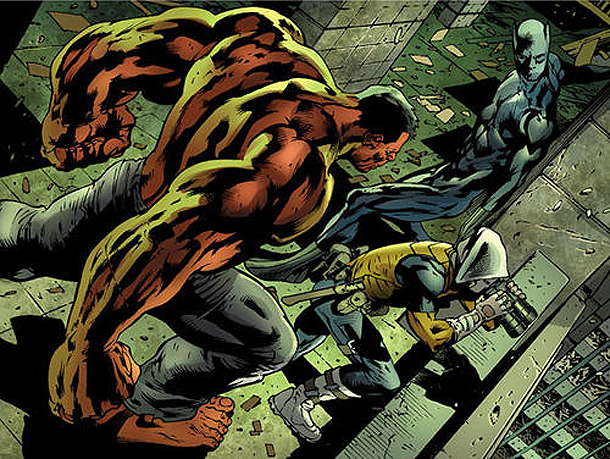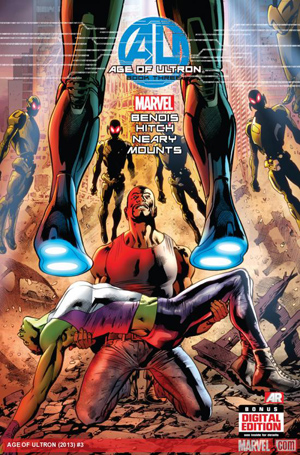Why you can trust GamesRadar+
Book Three
THE ONE WHERE Captain America has a plan and all it’s going to cost, odds are, is the life of one of the last heroes left. Tony Stark puts forward a pretty solid hypothesis as to why Ultron is trading for heroes whilst in Chicago the Black Panther, Red Hulk and Taskmaster attempt to fight back on a different scale. There’s just one problem; literally everything the heroes think they know is wrong…
VERDICT This was the issue where I was starting to get worried. Bendis has had a long held fondness for decompressing storytelling and in a lot of ways that’s a very useful technique. Warren Ellis has written, brilliantly, and at length, on how comics are one of the very few media where you can not only control the flow of time but speed it up and slow it down at will. Bendis’ use of decompression isn’t constant but he does like to play with the speed of the passage of time through a lot of his work. In fact, if you haven’t read any of his early, pre-Marvel crime work, Do so. Jinx and Goldfish are perfect examples of what I’m talking about and besides which, they’re pretty damn good in their own right.
But like I say, I was getting worried about Age Of Ultron . A friend of mine described the first two issues, more than a little accurately as. “Issue one, Cap’s sad. Issue two, Cap’s okay. And that’s it!” The first two issues have a pretty leisurely pace but, arguably, it’s needed to establish the sheer magnitude of the event as well as what exactly has been going on. This issue however, sees a small, but definite, increase in speed.
For a start, the opening is a nice piece of misdirection as we see Luke Cage and She-Hulk square off, talk and then Cage knocks her out. It’s a nasty, ugly punch and it causes even more property damage to the area around it. Cage then picks her up, throws her over his shoulder and heads off.
As cold openings go this is pretty great, and it’s neatly intercut with the conversation in the remains of the helicarrier. We not only get some solid deductive thinking from Tony Stark, as he figures out that Ultron is impersonating human emotions like greed and hatred and that’s why he’s trading for heroes, but we also get Cap’s plan: namely, to “sell” Ultron a hero – someone who’s tough and can get close enough to Ultron to gather some intel, do some damage and hopefully get back out.
It’s an awful plan.
It’s also the only one they have and leads to another go round between the various heroes about what they should do. This is really smartly done as we see the survivors begin to fracture along a couple of lines. Firstly, the core Avengers are pretty clearly leading the charge here, such as it is, and not everyone’s happy about it. One of the best moments in the issue comes when Hawkeye verbally beats up Tony Stark for daring to defend Hank Pym, the creator of Ultron. Tony, being a good scientist, thinks Ultron is just a project that got away from him. Hawkeye, being a realist, has no problem accepting that the man who built the robot that murdered the world probably has some questions to answer. It’s a nice moment, simultaneously fractious and cathartic as Clint says what we’re all thinking. I’m sure Pym’s going to be a vital part of the end game here, but how he can possibly be redeemed is frankly beyond me.
The other division that’s starting to show is between people who still have something to live for and people who don’t. One of the book’s best moments comes when Luke Cage is asked about his wife, Jessica, and their baby. He doesn’t say anything and suddenly you know why he’s volunteering for the suicide mission. This feels like the end of the world and by bringing it down to the very personal Armageddon Luke’s suffered, Bendis raises the emotional stakes very well.

In this issue’s, “Meanwhile, elsewhere in the USA”, Black Panther, Red Hulk and Taskmaster risk everything to get an Ultron head. It goes both well and very, very badly and the headid sappears as fast as it arrived, clutched in the hands of one my favourite villains. In terms of characterisation, there’s basically nothing here, but it’s a fast-paced, fun action scene and it finishes with a dirty great TO BE CONTINUED. That Ultron head is going to be pretty important later on, I suspect.
But, as is increasingly the case with this series, the meat is in the final reveal. Cage is taken to the heart of the Ultron Machine, in the middle of Times Square. There he finds not Ultron but… the Vision. Who really should be a good guy. And has really seen better days. And also… what the HELL? The third final page reveal is a hell of a step up from Cap’s sad/Cap has a plan and speaks to a sense of progression that some people had begun to worry the series just doesn’t have. Things are moving, the plot’s under way and everyone’s in even more trouble than they thought. Which should make issue four all sorts of fun.
THEORIES
(Check out the review of #1 for full list of theories)
Theory 1: This is the Marvel Now! Earth… now
Evidence for:
• Recent Spider-Man issues have established that whilst Otto Octavius is definitely in Peter Parker’s body, Peter’s soul is also still there and Otto is slowly learning to emulate him. Which isn’t ideal, let’s face it, as a fix, but it does the job. Besides, the idea of Otto being peppy and positive in the face of total machine apocalypse is actually rather sweet.
Theory 3: The Story Is Set In The Future
Evidence against:
• Again, the tie-in issues of Fantastic Four have them called back to Earth to help. This is pretty clearly both set in the current Marvel universe and essentially now. Which opens all sorts of interesting questions up.
BEST IMAGE The uncertain look Tony Stark and Captain America give one another as Cage and She-Hulk set out to almost certain death.

BEST LINES
“Keep it together, She-Hulk.”
“Sure. Because that’s an appropriate response for the end of the world.” I’ve been a fan of Jen Walters since the magnificent Dan Slott-scripted She-Hulk solo book and she’s on good form here. Jen’s one of the good guys, pragmatic, tough and compassionate and seeing her wig out a little here really raises the stakes.
“I don’t get you at all, Stark. I go out to save Spidey’s butt, you all act like I’ve taken a dump in the pool… Pym invents the thing that shuts down the world – does all this – and you’re all, ‘Well, he didn’t mean it.’” Hawkeye, consistently one of the most sensible people in the room.
Not so much a line, but I like how a lot of characters refuse to call Ultron by its name, but simply refer to it as “The Robot”. It’s a neat psychological trick, the heroes refusing to give their foe a name and also concentrating on his single identity rather than his many bodies.
WHO’S WHO AT THE END OF THE WORLD? It’s starting to look like the regular forays to other cities will give us a look at some of the other surviving characters and this week we get a really fun trio. Plus the green, yellow and red Synthzoid in the room. Or rather, in the vast structure in Times Square…
Black Panther – First appearing in Fantastic Four # 52 in July 1966, the Black Panther’s real name is T’Challa and he’s the king of Wakanda, a fictional African nation in the Marvel universe which is known for its vast scientific expertise. A lot of this stems from the deposits of Vibranium (a vibration absorbing metal, which Captain America’s shield is made of) that were uncovered in the country by T’Chaka, T’Challa’s father. T’Chaka was murdered and T’Challa avenged him by severely injuring the mercenary, Ulysses Klaw, responsible for his death. During this period in his life, he met and fell in love with an orphaned teenager called Ororo Monroe, who would grow up to become the X-Man Storm.
After years of being a valued ally to the Fantastic Four and an Avenger, T’Challa and Storm rekindled their relationship and were married. He attempted, and failed, to unite Captain America and Iron Man, leading to the events of Civil War and went on to take over as guardian of Hell’s Kitchen when Daredevil stood down for a while. More recently, he was the hero responsible for calling the Fantastic Four back to Earth to help with Ultron’s attack.
Red Hulk – Introduced in Hulk # 1 in January 2008, Red Hulk’s real identity was kept a mystery throughout his initial appearances. As strong as the Hulk but tactically gifted and clearly intelligent, the character cut a swathe through the Marvel universe, murdering long-standing Hulk foes Wendigo and the Abomination and destroying SHIELD’s helicarrier before finally being brought down by the Hulk (the green one) and Thor in San Francisco.
He was eventually revealed to be General “Thunderbolt’” Ross and the Red She-Hulk was his daughter, Betty Ross. Inducted into the Avengers, Red Hulk has been an important part of the team ever since, and currently also leads the Thunderbolts team.
Taskmaster – First appearing in Avengers # 195 in May 1980, Taskmaster is one of my favourite villains and is equal parts goofy and very cool. Taskmaster has the ability to mimic the physical movements of anyone he watches. This means he’s a fantastically gifted martial artist and, endearingly, works as a combat instructor for lackeys for other villains. He’s also, from time to time, been used to impersonate other characters.
In essence, he’s a trainer and sparring partner but he’s frequently used in very fun ways. He was a memorable part of two Deadpool runs, and more recently has become drawn to the heroic side of things. A recent Avengers Academy plot saw Finesse, one of the characters, seek him out thinking he might be her father. The two fight and Taskmaster reveals that the price for his abilities is that he often doesn’t form new memories unless they’re the physical traits and skills of an opponent. He admits he may very well be her father but just can’t remember, may well not remember her and fought her so she might be something he hung onto. Which is simultaneously horrible and really sweet all at once.
The Vision – First appearing in The Avengers #57 in October 1968, the Vision is this issue’s big reveal and with good reason. The Vision was created by Ultron to use against his creator, Doctor Henry Pym. Ghoulishly, he was based on the brain patterns of fellow Avenger, Simon Williams, also known as Wonder Man, who was dead at the time (and has since got better, been killed and got better again).
The Vision broke Ultron’s control on him and became a core member of the Avengers, marrying the Scarlet Witch and eventually fathering two sons with her, the pair using her Hex abilities to overcome the obvious biological concerns of a synthzoid and a human having children. However, following Wanda’s actions in Avengers Disassembled , he’s unable to reconcile with his wife. The original Vision ultimately left the team to discover himself. This seems to be the version of the character Luke Cage encounters at the end of issue three.
A second character named Vision, the combination of the Vision’s old Operating System and the armour of Iron Lad – a time traveling adventurer – served with the Young Avengers and Mighty Avengers for a time. He is killed at the end of Children’s Crusade when he refuses to let Iron Lad take the body of his dead girlfriend, Stature, to the future to be revived. The team opt to let him stay dead in the hopes that somehow he and Stature can be together somewhere.
UNANSWERED QUESTIONS
• Is this the core Marvel universe?
• Where was Ultron?
• Why did he invade?
• How did he win?
• Which heroes are still alive?
• Which villains are still alive?
• Has Ultron taken over the entire planet or just the US?
• Why are the Ultron units we see yellow?
• How long ago did Ultron invade?
• What is the vast structure over New York?
• What was Tony Stark terrified Ultron had infected Haweye and Spider-Man with?
• Why was Hawkeye told once he left the helicarrier he could never return?
• What happened to Captain America’s shield?
• Where is Iron Man’s armour?
• Why were the Guardians Of The Galaxy unable to defend the planet?
• What happened to Thor?
• How did Ultron deploy his machines so quickly?
• How did Ultron deploy his machines so fast?
• Who is the caped figure Spider-Man glimpsed at the heart of the Ultron Device? It sure looks a lot like Thor.
• What was the mission Black Widow and Moon Knight were sent on?
• What happened to Black Widow’s eye?
• What did Fury want with the people in the polaroids?
• Who’s on Fury’s wall?
• Is Nick Fury dead?
• What are Black Panther, Red Hulk and Taskmaster doing in Chicago?
• Why do they need an Ultron head?
• What role has Vision had in Ultron’s attack?
• Is he a prisoner?
Answered Questions
• When is this happening? – It’s starting to look, very strongly, that this is the present day, mainstream Marvel Universe.
• What is the “understanding” Ultron has with the villains? – He seems to be playing with human emotions like greed and hatred and is trading for heroes because that way he gets more people to “play” with. Of course the final page of the issue throws all that into doubt…
• Why didn’t Spider-Man’s spider sense go off? – Possibly because Otto’s still getting used to his abilities? Although there’s always the possibility that Otto/Peter wasn’t telling the truth…
• What’s The Plan? – To trade a particularly strong, tough hero to Ultron who can gather intelligence, cause some damage and have at least a shot at getting out alive. Which is a terrible, terrible plan but it’s not like there are many alternatives.
Alasdair Stuart
Age Of Ultron #3 is available now, priced £2.85. Thanks to www.travellingman.com for the review copy.



